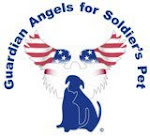via: North Carolina Crime Control & Public Safety

Have a pet emergency supply kit located with your family emergency kit:
•Ample supply of food, either dry or canned (pop top or have a can opener).
•Enough water to last from three to seven days.
•Pet feeding dishes.
•Muzzle, collar and leash.
•Proper identification including immunization records.
•Your pet's ID tag should contain his name, telephone number, and any urgent medical needs.
•Current photos of your pets in case they become lost.
•Medical records (stored in a waterproof container) and a first aid kit.
•A two-week supply of any medicine your pet requires.
•Pet beds and toys, if easily transportable.
•Disposable litter trays (aluminum pans are perfect) for cats.
•Litter or paper toweling.
•A pet traveling bag or sturdy carrier, ideally for each pet.
•Flashlight and extra batteries.
•Blanket (for scooping up a fearful pet).
•Proper fitting muzzle.
AFTER A DISASTER:
•Survey the area inside and outside your home to identify sharp objects, dangerous materials, dangerous wildlife, contaminated water downed power lines, or other hazards.
•Do not let animals drink flood water or any other water sources that may be contaminated as a result of a disaster.
•Keep cats, dogs and other small animals indoors and away from possible dangerous wildlife or debris outdoors.
•Release birds and reptiles only if necessary and only when they are calm and in an enclosed room.
•Reintroduce food in small servings, gradually working up to full portions if animals have been without food for a prolonged period of time.
•Allow uninterrupted rest or sleep for all animals to recover from the trauma and stress.
•Physically check animal control and animal shelters DAILY for lost animals.
•Post lost animal notices and notify local veterinarians and your neighbors of any lost animals.
•Put a lost or found classified ad in your local newspaper, or check the lost pet web sites at:
Share














